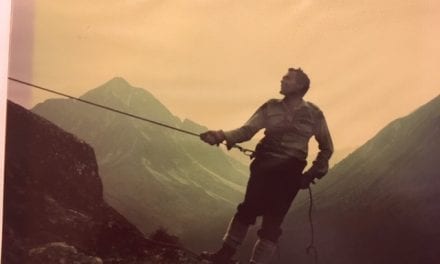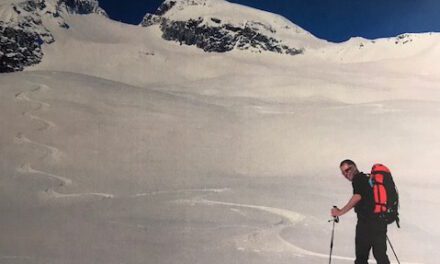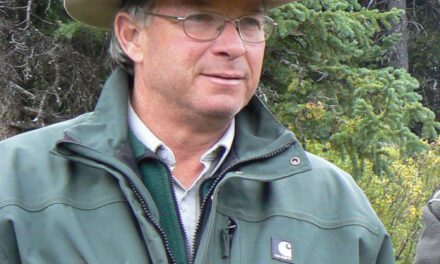Thank you to the Whyte Museum of the Canadian Rockies for granting permission to the Park Warden Service Alumni to post this interview on our website
Park Warden Service Alumni Society
Oral History Project winter 2018-2019
Interview With Don Dumpleton by Mary Dalman
Oral History Project Phase 8
May 7, 2019
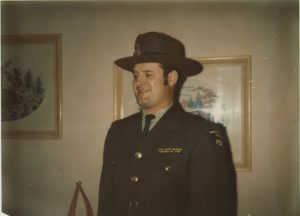
MD: Good morning, this is an interview with Don Dumpleton, and Don’s out in Chilliwack, BC. This morning it’s May 7th, 2019. So thanks very much Don, for being willing to do this interview for the Oral History Project. And many thanks for all the photos and the information, and write-ups you’ve sent so far. It’s been really helpful. So what I’m hoping to do today is just cover a few more areas of the interview in a little more detail, so if that’s OK with you, we’ll just get going.
Don: That’s no problem – go right ahead.
MD: What is your place and date of birth?
Don: I was born in Winnipeg, Manitoba, July 21, 1937
MD: Where did you grow up?
Don: I grew up in St. Vital, a suburb of Winnipeg, which now is incorporated into Greater Winnipeg.
How did you become involved in the Warden Service? Which National Park did you start working in?
Don: While still attending high school, I worked for the summer months as a forestry technician for the Manitoba Forest Service. Upon graduation, I continued in this position for a few years, when I was asked if I wanted to attend the Maritime Forest Ranger School in Fredericton, N.B. I, along with 3 other technicians attended the school with a verbal promise that we would get Assistant Ranger positions upon our return. Unfortunately, the government at that time cancelled the positions. As my wife and I were looking at getting housing, this fell through. A friend of mine told me that there was a competition for Wardens at Riding Mountain National Park, which I applied for, along with two others.
MD: What made you want to join the Warden Service?
Don: Basically to get a house. Unfortunately, there was only one house available, and we didn’t get (one) until two years later. We lived in a one-room tower cabin in the summer and a winterized tourist cabin in the winter.
MD: What different parks did you work in? How did they compare? Do you have a favourite?
Don: I worked in Riding Mountain for 12 years, rising from an Assistant Warden, to District Warden, and then to Senior Park Warden, where I was responsible for one-third of the Park with several District Wardens reporting to me. This soon developed (to) where I was given two-thirds of the Park to look after, with 8 or 9 Wardens reporting to me. I then applied for Chief Park Warden, and was successful in going to Georgian Bay Islands National Park as Chief.
Riding Mountain N.P. 1959 to 1971
Georgian Bay Islands N.P. 1971 – 1973
Jasper N.P. 1973 – 1991
I liked Georgian Bay for the short time I was there because if I got tired of office work, it was easy to just walk down to the dock, and take my Grew 24’ boat on the waters of Lake Huron.
MD: What were some of your main responsibilities over the years?
Don: At Riding Mountain I prepared a fire control plan for the park. At Georgian Bay, this was an all-island National Park, where I was responsible for not only the Warden Service, but Visitor Services as well. Jasper was my biggest responsibility as my staff was roughly 27 permanent wardens, 10 – 12 seasonals, as well as support staff – stenos (3), a senior horseman, and trail crews.
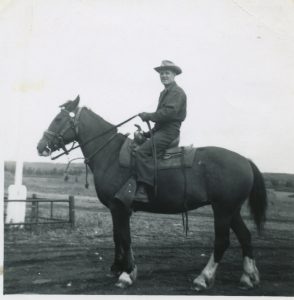
Don on Blaze at Riding Mountain NP
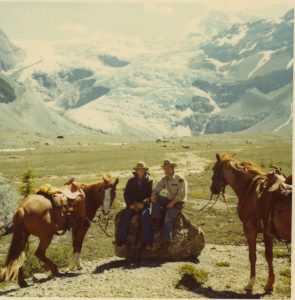
Don and daughter Sherri in Jasper NP
MD: OK, thanks a lot. What I was hoping to ask you about was your time at Georgian Bay Islands National Park. I know you were only there for a couple of years, but I don’t think we have a lot of information on those island parks as yet. Could you go over what the warden duties were in a park like that?
Don: Well, basically it was all water work. All of us had patrol boats, and we had islands up and down the coastline for 40 miles. And also Flowerpot Island at the end of the Bruce Peninsula. (To travel to our office on the main island in fog and heavy rain, this is what we had to do. After going through the little Dog channel with your boat and seeing the channel marker, you set your boat on a certain direction and set your RP on the motor on a specified setting. You then travelled until you spotted the next channel marker and continued with new settings until you found the next channel.) So what I did while I was there (at GBINP) – there was no overnight accommodation anywhere, so I started sending a warden down in the summertime to Flowerpot Island, and we’d switch every week, and I built a cabin there so I could stay overnight. And we had a deal with one of the boatmen there for him to get into town for supplies or anything like that. And then up at 12 Mile Bay which is at the far end of the National Park islands. You had to go out into the open part of the lake three times while you were going up there – you couldn’t get behind the protection of islands. And so, a lot of times the fog would come in or the wind would get up and away, so it would be too big for our boats. So I built a cabin on one of our bigger properties up there so our staff could stay overnight if they got stuck. The other thing I did while I was there – the top end of the park was Cambrian Shield, and the southern part was Great Lakes – St. Lawrence Forest Region. So the forest region on the south wasn’t bad – there was a trail we could drive with our Jeep on the island, but on the Cambrian Shield, you couldn’t. So we made trail markers so people wouldn’t get lost on the trail. And it worked out pretty good. The markers kind of fit in with the rock, so they weren’t standing way out.
MD: What kind of incidents did you have to respond to at Georgian Bay?
Don: We helped the OPP (the Ontario Provincial Police) quite a bit, because usually when there was a water problem, we were the closest ones to it. So people, particularly the locals, would do all kinds of stupid things – you know, travel without lights and whatnot. I remember one night I got a call, because I lived on the mainland, from one of my wardens out there, and there was a domestic dispute going on in the campground. So I started out with my boat – they had it all worked out – even if it was pitch black and you couldn’t see a thing. They had it all worked out with the marker buoys, so you could run your boat at a certain RPM until you hit the next marker buoy, and then change your direction, so you managed to get there. But we had a big strobe light on the boathouse, and you could see that once you got into the open part of the lake, and I was just going to make my turn to go to the boathouse, and I caught some movement out of the corner of my eye. So I stopped and put my searchlight on – if I’d made my turn two seconds sooner, I would have run this guy right over – no lights, family in the boat, two kids and a wife and father. It is dangerous, and there’s a lot of rocks. It’s almost like the ocean to some extent, because depending on which way the wind blows – if it’s blowing off land, then places where you could have gone earlier in the day, you can’t go because the wind is blowing the water out. And it’s the reverse the other way, and you get about three and a half feet of water coming in. So where you could go there was almost anywhere, but you had to know where you were going, that’s for sure.
MD: You were Chief there, and how many wardens did you have?
Don: I only had one permanent and two seasonal (wardens). But while I was there, I also looked after the Visitor Services – it came under me, and they had 4 people. The only thing I can mention there (at Georgian Bay Island National Park) that was kind of hard with it – deer would come off the island and get into the water (there were a lot of deer on the island), but the minute they were into the water, anybody could shoot them if it was season. It didn’t make any difference – the high water mark was the Park boundary. The water was shallow, so the deer would be going out for a drink of water, and people would swing by in a boat and shoot them if it was deer season. The other thing I didn’t like (at GBINP) but it didn’t really have anything to do with me, but the hunters were allowed to use dogs to hunt deer outside the park, and I didn’t agree with that. It didn’t have anything to do with me in the Park, except in the springtime – the dogs would get together in packs, maybe 30 of them, and they’d come on to the islands and chase the deer out on to the ice, and then just hamstring them. They’d come from thirty miles away in the spring. You’d have to try to shoot some of them.
MD: And they were just stray dogs?
Don: No, they were owned dogs – in fact, the Chief Warden, Gerry Campbell, who was there before me – he shot some guy’s high-priced hunting dog. They took him (Gerry) to court, but Parks won.
MD: I wanted to go over a bit too about Riding Mountain, because you were there for 12 years – and it was the early days there, back in the 60’s. Why did poaching seem to be such an issue there at Riding Mountain?
Don: Well, in most places, the farmlands came right up to the Park boundary, so it was very easy for (the poachers) to slip in. A lot of them were inter-related and so on, so if they saw you going one direction on horseback, they’d phone their friends the other way. They had the in! And basically, when it started was in the 30’s when a lot of people came from Europe – that was the way they fed their families in the early years – just go in and poach. And actually, wardens that were stationed out on the Districts – when winter came, you were stuck there. They didn’t plow the roads when I first started. And so, a lot of times, wardens before my time would shoot an elk too for food for their families. Before my time, wardens had to buy their own horses, and they had to supply their own feed. It was kind of tough for some of them.
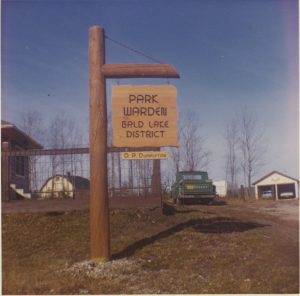
MD: So when do you think things changed? When did they start getting tough on poaching?
Don: Well, we were always tough on poaching whenever they could. The only problem was when I started, the Department of Indian Affairs and Northern Development – we were under that Department. So if you caught an Indian poaching in the Park, you may as well let him go, because our own Department would hire him a lawyer! So what we did – they used old .303 rifles from the war – we would just confiscate the rifles and tell them to get the hell out of the Park. Because it was a waste of money to do anything else.
MD: Were some of the farmers around the park involved in poaching too?
Don: Oh, all kinds of them. We used to – I guess they felt I had a position or something, and we used to get invited to all the weddings, and the christenings, and whatever was going on – like the dances going on in the area. I remember my wife – I wasn’t much of a dancer, but I would go and she would have a good time dancing. This one guy started telling her about all the poaching he did, so she said to him, “Don’t you know who my husband is?” “Oh” he says, “I know – but if it wasn’t for guys like me, he wouldn’t have a job!” (laughs) And then a few years later, another warden and myself, we caught him about 5 miles inside the park. We were in a big Bombardier – a 12-passenger – and he just stepped off the track and waited until we got there. And he says “You got me.” and he handed over his rifle, and that’s all there was to it.
MD: So it sounds like poaching was just sort of an understood thing.
Don: Oh well, if it was nice and sunny, you didn’t have to worry, but if it rained so the farmers couldn’t work in the fields, then you started worrying, because they’d be in the Park if it rained. One time when I was at Clear Lake, my wife was in the hospital having a baby, and there was a woman in the next bed with her, and her husband didn’t have a car, so I had to pick him up and drive him. I had just pinched him two weeks before for poaching! But they did it, and that’s all there was to it. It’s dropped right now, but I don’t agree with it – they’ve moved all their wardens now into Clear Lake, and they’ve closed all of the warden stations. If there was a big space between the Park boundary and the people outside, I’d say yes, that’s OK, but at most places, it’s cleared right up to the Park boundary.
MD: Was there any bear-baiting going on when you were there?
Don: No – I heard about some of it afterwards, but most of it was being done outside the Park.
MD: I was also wondering about all the work you did at Riding Mountain with the large fires, and the farmers coming in and getting the lumber afterwards.
Because of my training and experience with the Manitoba Forest Service, I was put in charge of some large fires, and then supervised local farmers that were allowed in to cut timber in the fire areas. The first day, I had to assign, to one hundred farmers, cutting areas for lumber, rails, and fence posts, which all had to be scaled before any left the Park. (Scaling involves using a scaling stick in which one has to usually measure the larger end of the log 2 to 3 times depending on the end shape of the log. The average of two sticks is then the estimate of lumber within the log. This of course varies depending on the length of the log. Rails were measured according to length. Posts were roughly 8 to 9 feet and were counted individually.) I was the only Warden in the Park who could do this because of my training experience. The first winter, 6 million board feet of lumber was taken out, and thousands of posts and rails. I worked from 7:00 AM until 7:00 PM, and then spent hours issuing permits.
Well, they had a policy that they’d let the farmers have 6000 board feet of lumber, and it went on for three years. The first year, I took out over 6 million board feet of lumber. And then the rails, and fence posts, and all that stuff – I can’t even begin to count the amount. So that went on for three years. Finally, in the second year, they gave me another warden to work with – because it was really time-consuming. I remember one night, we decided to go into Clear Lake – we were 50 miles away. So we went in and visited friends, got home at midnight, and there was three carloads of people wanting permits when I got home! So I didn’t have the heart to say “No way – come back again tomorrow.” So I sat in the office until three o’clock in the morning issuing permits.
Then you have to understand, none of the other guys had any experience in doing any scaling or anything like that. Scaling means – there’s a stick you use – a scaling stick, and you’ve got to know how to use it (to determine the volume), because all trees and logs are different. The first year I went to all the lumber mills outside the Park where these guys were getting their logs cut, and I only had one guy that was below 6000 feet, and he was only 5996 or something like that. It was so close, but everybody else was like 100 – 200 feet over. I won’t mention his name, but there was a guy on the north side of the Park, and the fires were big enough that he had to have people cutting. They’d issue them a permit, and told them to go find it. I’d be working up in my area, and I’d hear these rifle shots go off, but I was too busy to even bother about it, because they were over in his area. But you can’t fault him – he had no training or understanding of it. But I only allowed one road into the park where the fires were, and they had to come past my warden station to get out. That was the only way they could get out – and if it wasn’t scaled, then I had to do it before they left. Otherwise, we could have charged them.
Again, with the forest fires, I didn’t have a tremendous amount of experience, but I had some working with the Manitoba Forest Service, whereas all the other guys never had a clue how to fight a fire. It’s quite a bit different today, but at that time, no.
They put me in charge of boat patrol the first summer on the lake – checking fishermen and the Department of Transport regulations, and then I mentioned about the elk slaughter we had – I got put in charge of that, and any big job that came along – I got stuck with it.
